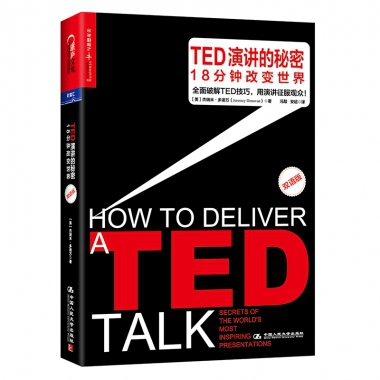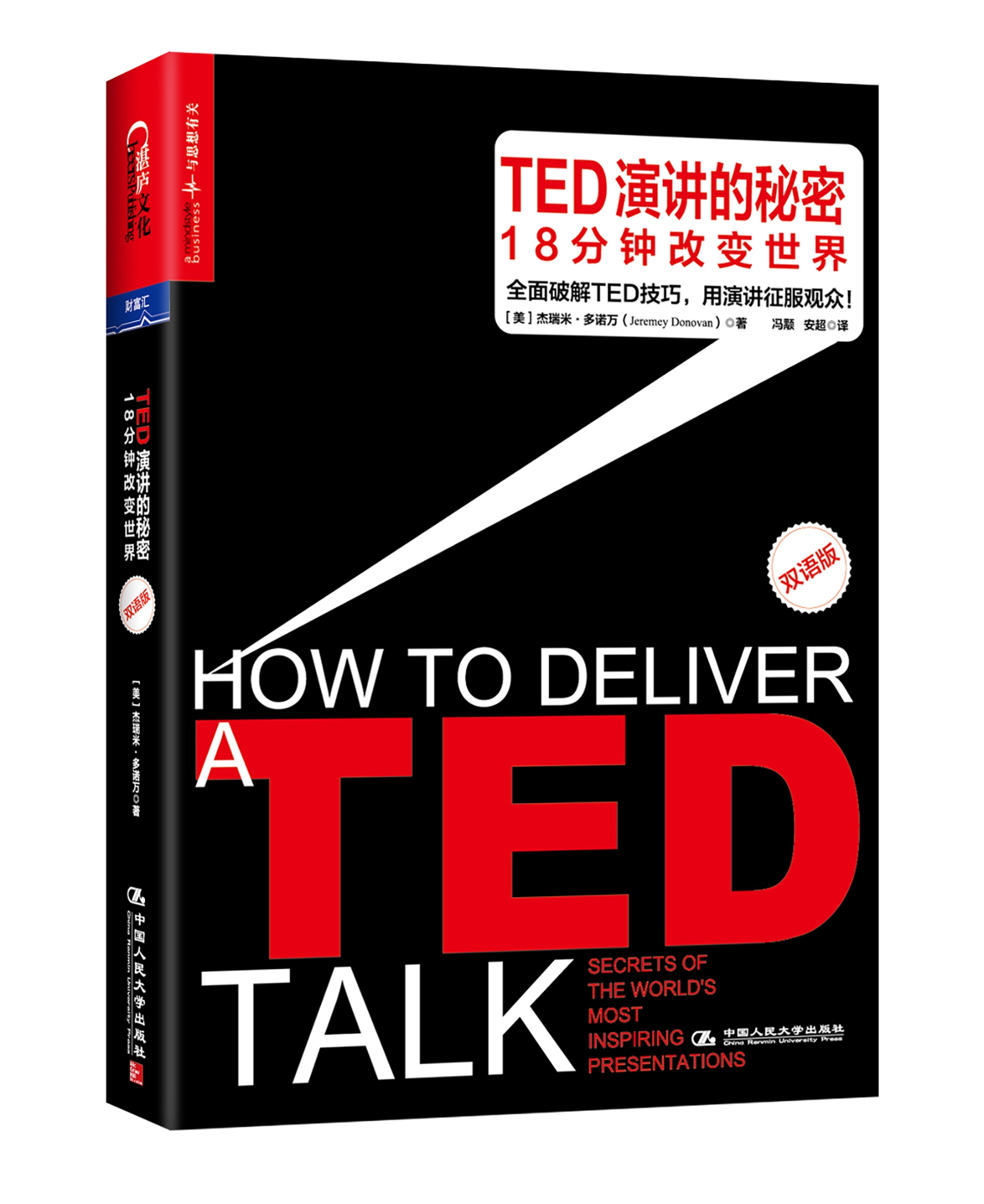
出版社: 中国人民大学
原售价: 69.90
折扣价: 46.83
折扣购买: TED演讲的秘密(18分钟改变世界双语版)
ISBN: 9787300248707

【美】杰瑞米·多诺万 ?TEDx大会组织者和演讲者,TED和TEDx演讲者教练,致力发展公开演讲及领导能力的知名NGO团体国际演讲会的长期成员。 ?全球知名资讯科技研究及顾问公司?高德纳咨询公司的营销副总监,擅长领导成功的商业团队进行新产品研发、营销研究及产品管理。
讨论你“熟悉与热爱”的话题 这本书将让你收获如瑞士军刀一般万能的演讲技巧与窍门,从而进行富有感染力的演讲。请谨慎地使用这些技巧,就像使用其他拥有锋芒的物品一样。公开演讲所面临的最大挑战就是过度修饰辞藻反而使内容失去了可信性。当你将话题限定在你所感兴趣的事物上时,会产生神奇的效果。紧张的情绪即刻得以平复,你能够不假思索地构建起众多具有说服力的论据。你将滔滔不绝地讲述一个又一个故事,借此将观点传达给听众。当我询问TED大会的知名演讲者西蒙· 斯涅克是怎样练就他那天赋异禀的演说能力时,他也认可了上述理论: 当人们问我,我是如何学会演讲的,我会告诉他们:“说实话,我是投机取巧的!我只谈论那些我感兴趣的或是我熟知的事物。我无法去刻意制造热情。为人父母者可以连续四个小时滔滔不绝地谈论他们的孩子,我所做的其实也一样。我分享给大家的观点,就像是前面说的孩子——是我非常非常感兴趣的话题,同时我也充满了热情,想要将这些故事分享给所有愿意聆听的人。” 很多演讲方面的专家会在书本和演讲中建议大家,先去了解听众想得到什么,然后再筛选相应的信息来满足他们的需求。这条建议的出发点虽好,但也突显了一点不足。尽管为听众量身打造演讲内容十分重要,但是你所做的修改应该仅限于一些非核心内容的优化。例如:为了能够让听众更直观地产生联想,你可以换一个更合适的插图,或是考虑到听众较高的 知识水平,你可以酌情增加背景信息的比重。但我坚信,与其像风中芦苇一样摇摆不定,不如去寻找真正认可并且渴望获得你的观点的听众。幸运的是,TED大会的听众总是迫切地想要聆听一切值得分享,并且能够指导、取悦和启迪他们人生的奇思妙想。 我组织过好几次TEDx 活动,也曾担任过其他许多活动组织方的顾问,因此经常有一些希望登上TED演讲台的人,以及一些已经确定下来的演讲者找到我,问我怎样做一个为听众所认可的演讲。但我想大部分读者更感兴趣的是如何提高公开演讲能力,而不是真的想站在TED的讲台上,因此关于这个话题,我将留到后面详细讨论。不过,在这里我想跟各位读者分享一条最重要的建议,这也是我分享给前来咨询的人的。 他们问我,什么样的演讲才能得到听众的认可,我也用一个问题回答他们:“你为什么要做这个演讲?”多数情况下,回答是这样的:“因为这是我树立自己品牌的最好机会。”或是:“因为我从第一次看到TED演讲的视频开始,就梦想能登上这个舞台。”他们够坦诚,至少这一点还是值得称赞的。 然而,这些回答的问题在于,他们都是以演讲者为中心,而没有以听众为中心。TED的组织方从一千米之外就能嗅到这一点,而这正是决定演讲成败与否的关键。这个问题的正确答案应该是这样的:“因为我有非常强烈的愿望去分享一个观点,即使听众之中只有一个人在心灵和思想上被触动,我也会心满意足。”有了这个回答,即使视频有质量问题,没法传到网上,这场演讲也已经成功了。 西蒙· 斯涅克给过我一条建议,我也留给各位读者: 最重要的一点是,我出场的目的是为了给予。我经常在上台之前大声告诉自己:“今天你来到这里是为了分享你的观点。”不管什么时候做演讲,我从不带着从任何人身上获取些什么的想法,比如生意、赞许、卖书、Twitter 上更多的粉丝,或Facebook上更多的“赞”。我出场是为了分享我所知道的东西。如果观众喜欢,他们就会鼓掌。对我来说,这也是检验自己所给予的东西对观众是否重要的最佳方法。 Speak about a topic you are passionate about. From this book you will absorb a Swiss Army knife’s worth of techniques and tricks for delivering a powerful speech. As with any sharp object, please exercise caution. The single greatest danger in public speaking is losing authenticity by overengineering your talk. However, amazing things happen when you confine your speaking to a topic that you are passionate about. Your nerves subside. You automatically build persuasive arguments. Stories roll off your tongue. And your delivery becomes an afterthought. TED star Simon Sinek confirmed as much when I asked him how he delivered his magical talk: When people ask me how I learned to speak I tell them, truthfully, that I cheat! I only talk about things I care about and about things I understand. I can’t manufacture passion. People who have kids can talk for hours about their kids. They tell story after story after story with such excitement. I do the same. The ideas I share are like children—I really, really care about them and I am excited to share stories about them to anyone who will listen. Many people who write and speak about speaking advise you to figure out what the audience wants and then adapt your message to suit people’s needs. This well-intentioned advice has a downside. While it is important to tailor content to an audience’s needs, your alterations should be confined to cosmetic changes. For example, you might swap one vignette for another that your audience can more directly relate to. Or you might change the amount of background information you provide given your audience’s prior knowledge. I believe it is far better to seek out audiences who want and need your ideas rather than bending like a reed in the wind. Fortunately TED audiences are eager to experience any idea worth spreading that educates, entertains, and inspires them. Having organized several TEDx events and been an advisor to organizers of many others, I am frequently approached by hopeful as well as established professional speakers for advice on how to get accepted to give a talk. Since I suspect most of you are more interested in improving your public speaking ability than in actually being on the TED stage, I will save a detailed overview of that topic for Part IV of this book. However, I would like to share with you the single most important piece of advice I share with them. I respond to their question of how to get accepted for a talk with the question, “Why do you want to give a talk?” In most instances the response is, “Because this is a golden opportunity to build my brand,” or “Because I have dreamed of giving a TED Talk ever since I saw my first TED video.” You have to at least give them credit for their honesty. The problem with these answers is that they are speaker centric rather than audience centric. TED organizers can smell this from a mile away, and it is a major turnoff. The right answer is, “Because I have an insatiable need to share an idea worth spreading even if it touches the heart and mind of just one person in the audience.” With that answer, you have succeeded even if your video has quality problems and never makes it online. I’ll leave you with the advice that Simon Sinek gave me: Most importantly, I always show up to give. I very often say it out loud to myself before I take the stage, “You’re here to share your ideas today.” Whenever I speak, I don’t show up wanting anything from anyone—e.g., more business, approval, sell books, more Twitter followers, or Facebook likes. I always show up to share what I know. If they like it then they will applaud, which is the best way for me to gauge if what I gave was important to them. TED演讲为什么能够风靡*?为什么不超过18分钟的演讲,平均点击率却超过百万次,*高的甚至超过2500万次?为什么连比尔·盖兹、史蒂芬·霍金、阿尔·戈尔这样的商界、学界与政界精英都竞相登上TED的舞台?TED演讲的秘密究竟是什么? 首部全面解析TED演讲的实践力作!网易公开课专题力荐!日本*演讲类图书第*名!台湾诚品书店2013年度财经商业类畅销书! 你也许永远没有机会真正地登上TED舞台,但你依然需要用激励他人的方式去传递自己的想法。而且,TED演讲的理论和技巧同样适用于商务演讲和会议,甚至可以运用到任何一个公共演讲场合,无论是在学校,还是参加会议,甚至是婚礼和其他特殊场合。
